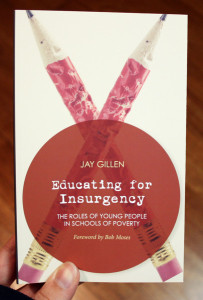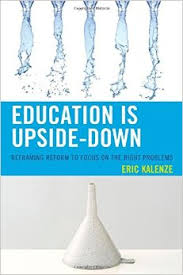 In Learning What You Cannot Say: Teaching Free Speech and Political Literacy in an Authoritarian Age John L. Hoben, a Professor of Law and Education at Memorial University in Newfoundland, explores the issue of free speech from a critical pedagogy perspective, arguing that, in the face of increasingly neoliberal policy and bureaucratic structures, strong teacher speech and a valuing of legal literacy is essential to sustaining an open and democratic culture. Hoben’s research and discussion spans his personal experiences as a teacher in rural communities, current international events such as privacy concerns revealed by the Snowden NSA documents, and the intertwined issues of free speech, tolerance, and censorship, accomplishing a wide-reaching overview of the challenges and possibilities of meaningfully teaching political literacy today.
In Learning What You Cannot Say: Teaching Free Speech and Political Literacy in an Authoritarian Age John L. Hoben, a Professor of Law and Education at Memorial University in Newfoundland, explores the issue of free speech from a critical pedagogy perspective, arguing that, in the face of increasingly neoliberal policy and bureaucratic structures, strong teacher speech and a valuing of legal literacy is essential to sustaining an open and democratic culture. Hoben’s research and discussion spans his personal experiences as a teacher in rural communities, current international events such as privacy concerns revealed by the Snowden NSA documents, and the intertwined issues of free speech, tolerance, and censorship, accomplishing a wide-reaching overview of the challenges and possibilities of meaningfully teaching political literacy today.
Baltimore public school teacher, Jay Gillen,  anticipates recent current events in his monograph Educating for Insurgency: The Roles of Young People in Schools of Poverty. Gillen sheds light on the daily lives of disadvantaged students in the public school system, and calls for young radical teachers and organizers to help students to build “social, intellectual, and political power.” His work draws on the revolutionary spirit of earlier educational activists such as Paulo Freire, who remains a touchstone figure in the fight for educational equality and an influential thinker for the OISE community.
anticipates recent current events in his monograph Educating for Insurgency: The Roles of Young People in Schools of Poverty. Gillen sheds light on the daily lives of disadvantaged students in the public school system, and calls for young radical teachers and organizers to help students to build “social, intellectual, and political power.” His work draws on the revolutionary spirit of earlier educational activists such as Paulo Freire, who remains a touchstone figure in the fight for educational equality and an influential thinker for the OISE community.
New from the Transgressions series in  Cultural Studies and Education is Origins: A Sustainable Concept in Education, edited by Fred Dervine and Hanna Ragnarsdóttir. Split into two sections, Origins begins by problematizing and deconstructing the idea of origins as it has been traditionally interpreted in educational programs. Analyzing this sensitive issue, the authors in this volume provide new outlooks on the topic and propose a reinvention of the use of origins in ethical educational discussions of “identity, otherness, culture, and power.”
Cultural Studies and Education is Origins: A Sustainable Concept in Education, edited by Fred Dervine and Hanna Ragnarsdóttir. Split into two sections, Origins begins by problematizing and deconstructing the idea of origins as it has been traditionally interpreted in educational programs. Analyzing this sensitive issue, the authors in this volume provide new outlooks on the topic and propose a reinvention of the use of origins in ethical educational discussions of “identity, otherness, culture, and power.”
 In Leadership for Culturally and Linguistically Responsive Schools, Martin Scanlan and Francesca A. López combine theory and practice in a guidebook for educational leaders who aspire to create schools that are responsibly engaged in their diverse student populations. Appreciative of real-world complexities, Scanlan and López move between research and reality to offer a framework for meaningful and ongoing progress in education. Their book contains exercises and case studies to engage ideas, as well as links to a companion website and blog for additional resources and to “foster ongoing learning.”
In Leadership for Culturally and Linguistically Responsive Schools, Martin Scanlan and Francesca A. López combine theory and practice in a guidebook for educational leaders who aspire to create schools that are responsibly engaged in their diverse student populations. Appreciative of real-world complexities, Scanlan and López move between research and reality to offer a framework for meaningful and ongoing progress in education. Their book contains exercises and case studies to engage ideas, as well as links to a companion website and blog for additional resources and to “foster ongoing learning.”
Eric Kalenze’s bold title statement, Education is Upside Down: Reframing Reform to Focus on the Right Problems,  stems from a survey of the historical factors and political movements that have led to an education system that is not meeting the needs of today’s students. Kalenze attempts to answer the questions about why reform in America’s educational system is not working, and offer solutions as to what might be done about it. Canadian educational scholars will benefit from Kalenze’s historical approach to current issues in education reform and his suggestions for change.
stems from a survey of the historical factors and political movements that have led to an education system that is not meeting the needs of today’s students. Kalenze attempts to answer the questions about why reform in America’s educational system is not working, and offer solutions as to what might be done about it. Canadian educational scholars will benefit from Kalenze’s historical approach to current issues in education reform and his suggestions for change.
